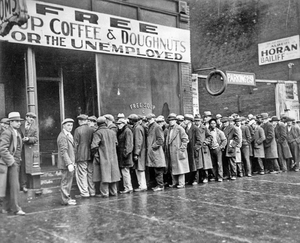More languages
More actions

Unemployment is the condition of a worker seeking employment that cannot find work anywhere. Since the Industrial Revolution, it has provided the bourgeoisie with a reserve army of labour. This reserve can be quickly deployed to work in rapidly expanding markets, or, alternatively, it can be kept as a threat to employed workers, in order to maintain low wages.[1]
Unemployment is extremely rare in socialist countries. For example, the GDR guaranteed a job for everyone. Although some people refused to go to work, they cost the economy only 0.1% of scheduled work hours.[2]
References
- ↑ Karl Marx (1867). Capital Volume One: 'Chapter Twenty-Five: The General Law of Capitalist Accumulation; Section 3'.
- ↑ Austin Murphy (2000). The Triumph of Evil: 'A Post-Mortem Comparison of Communist and Capitalist Societies Using the German Case as an Illustration' (p. 94). [PDF] Fucecchio: European Press Academic Publishing. ISBN 8883980026
